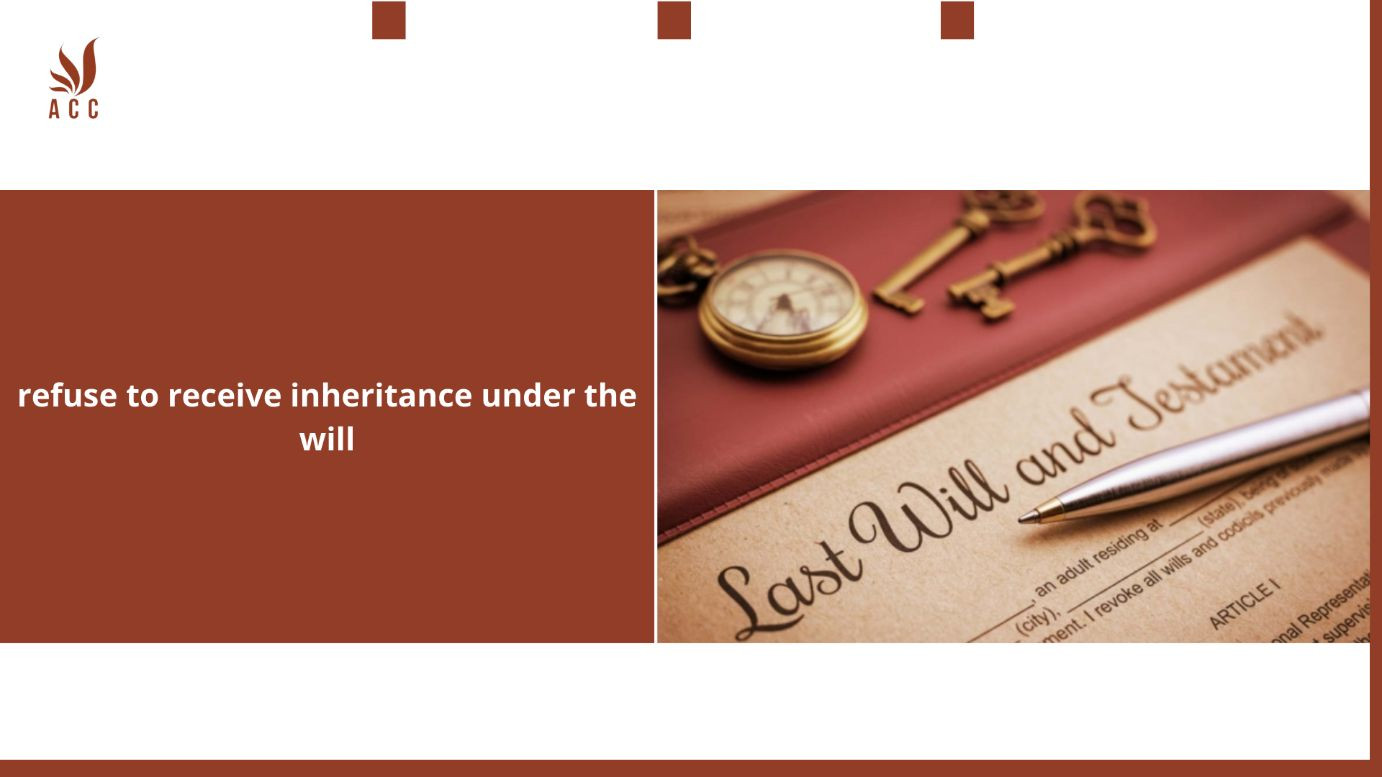A person who has been named as a beneficiary in a will has the legal right to refuse or disclaim their inheritance if they choose to do so. This is known as "disclaiming" an inheritance. Here are some key points to understand about refusing to receive an inheritance under a will:
1. Voluntary Decision:
Disclaiming an inheritance is entirely voluntary. The beneficiary is not obligated to accept the assets or property designated for them in the will.

2. Timely Action:
In most jurisdictions, there is a specific timeframe within which the beneficiary must make their decision to disclaim the inheritance. This timeframe is typically set by law and may vary by jurisdiction but is usually a relatively short period, often a few months after the death of the testator.
3. Formal Written Statement:
To disclaim an inheritance, the beneficiary must typically submit a formal written statement to the executor of the estate or the probate court, clearly expressing their intent to disclaim the inheritance. The statement may need to meet specific legal requirements.
4. No Partial Disclaimers:
In many cases, partial disclaimers are not allowed. Beneficiaries must generally disclaim the entire inheritance rather than choosing to accept some assets and refuse others.
5. Consequences of Disclaimer:
Once a beneficiary disclaims an inheritance, they forfeit their rights to the assets or property. It is as if they were never named as a beneficiary in the first place. The inheritance then typically passes to the contingent beneficiaries or follows the alternative distribution instructions in the will.
6. Tax Considerations:
Disclaiming an inheritance can have tax implications, so it's advisable for beneficiaries to consult with tax professionals or attorneys before making this decision. Depending on the jurisdiction and the specific circumstances, disclaimed property may be treated as if it had passed directly from the deceased to the next eligible beneficiary.
7. Personal and Financial Factors:
Beneficiaries may choose to disclaim an inheritance for various reasons, including financial planning, asset management, estate tax considerations, or to allow assets to pass to other family members who may need them more.
8. When using ACC Law Firm's testament, entrepreneurs will receive
When using ACC Law Firm's testament, entrepreneurs will receive professional legal advice and assistance in drafting a comprehensive and legally binding will that reflects their specific business needs and objectives. The testament will ensure the smooth transition of their business assets and help protect their interests and those of their beneficiaries. Additionally, entrepreneurs will have access to ongoing support and guidance from experienced attorneys who specialize in estate planning for entrepreneurs.
9. Q&A
Q1. Can a beneficiary refuse to receive an inheritance left to them under a will?
Answer: Yes, a beneficiary can refuse or renounce their inheritance left to them under a will. This is known as "disclaiming" the inheritance. Beneficiaries have the legal right to make such a decision, and it is typically done through a formal legal process in accordance with the laws of the jurisdiction.
Q2. What are some reasons why someone might choose to refuse an inheritance under a will?
Answer: There can be several reasons for refusing an inheritance, including:
- To avoid inheriting debts or liabilities associated with the estate.
- To minimize tax implications or estate-related costs.
- To ensure assets pass to other beneficiaries or heirs as intended by the testator.
- Personal or financial considerations that make accepting the inheritance undesirable.
Q3. How does one formally refuse an inheritance under a will?
Answer: Refusing an inheritance typically involves filing a written disclaimer or renunciation with the appropriate legal authorities, such as the probate court or executor of the estate. The disclaimer must be made within a specified timeframe, often within a few months after the testator's death, and should meet the legal requirements of the jurisdiction.
Q4. What happens to the refused inheritance after a beneficiary disclaims it?
Answer: When a beneficiary disclaims or refuses an inheritance, the assets or property typically pass to the next eligible beneficiary in line as specified in the will or according to the laws of intestate succession if there is no alternative beneficiary named. The refused inheritance does not become part of the disclaiming beneficiary's estate, and they have no further claim to it.
Nội dung bài viết:






Bình luận